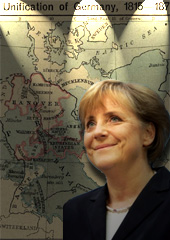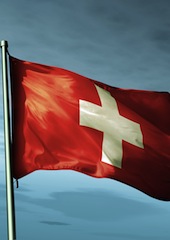Angela Merkel’s True Colors
Is Angela Merkel aiming to be the most successful Social Democratic Chancellor in German history?
November 21, 2013

There has been a sneaking suspicion all along about Angela Merkel. Even though she is the leader of the CDU, Germany’s right of center party, some people have been wondering for a long while about whether the German Chancellor deep down is a dyed in the wool Social Democrat.
Certainly ever since Merkel first rose to Germany’s top political post in 2005, there had been doubts whether she was really prepared to take the tough decisions required to further advance the economic reform process in Germany.
After all, her predecessor in office, Gerhard Schroeder, had very surprisingly chosen to clear out most of the economic deadwood with his Agenda 2010. Thereby, he had in effect done the political bidding that would usually be expected from the conservative party.
Schroeder’s package of structural reform measures did lead to a profound house cleaning in Germany. His main achievements were making labor markets more flexible and reducing the costs of Germany’s ample welfare system. Of course, his courageous reforms eventually not only split his own party, but also cost him his reelection.
Daring, hesitant and inconsistent
Angela Merkel is an interesting combination of some daring and extreme caution. Dare she certainly did, for example, when she courageously launched the energy transformation in Germany.
Not so impressive was her constant hesitation to stay on the reform bandwagon on economic issues. It is possible that Merkel was chastised by a near election loss of her own in 2005. Her then-opponent Gerhard Schroeder almost caught up with her in the waning days of that campaign, despite her earlier considerable lead.
That experience, when she had indeed been articulating the need for more reform measures, certainly buttressed her natural tendencies toward cautious moves on the economy.
At the time, a more relaxed stance was quite all right. Schroeder’s reforms had real bite and Germans still needed to adjust to the overall package.
Over the past four years, Merkel had been lucky in that the global economy, despite all its problems, worked in Germany’s favor. That allowed Merkel, piece by piece, to dole out more goodies to her electorate, while prescribing consolidation to our nations.
But in now opting for a grand coalition with the SPD, which clearly is no longer Schroeder’s party of economic reformers, the conclusion is inescapable that statism is on the march in Germany. It pairs two parties who, for varying reasons, strongly believe in the power of the state.
What is known about the emerging coalition agreement so far indicates that it is rooted in a broad effort to further perfect the German welfare state.
There is also a danger that it will turn into a race toward the lowest common denominator, where both parties compete on handing out more benefits.
Of course, it would be far too shallow to argue, as some do, that making these political choices is a function of Angela Merkel having grown up in Socialist East Germany. What is fair to say is that she has an inclination, as many a politician does, to seek the path of least resistance.
Political choices are blending
And her choice also reflects what has been happening in Germany for some time – that the political choices are blending ever more into each other, rather than offering clearly differentiated profiles.
The core problem is that, in her speeches, Merkel always forthrightly addresses key issues of the future, such as aging, Europe’s overly strong emphasis on welfare benefits, the need for more innovation and education, as well as better infrastructure. But then, when it comes to actual decision-making, she does little about implementing anything relevant in the trenches of politics.
In other words, she pays lip service to the issues, but does not fight or budget for the logical measures to be taken.
As things currently stand, the German Chancellor seems to be prepared to go to great length in order to form a grand coalition with the SPD. Her willingness to compromise includes many items that were considered non-negotiables until very recently.
In the end, the only thing that may spare the CDU the creeping social-democratization that is underway is the profound dislike and complete unease that many rank-and-file members of the SPD feel about forming a coalition with the CDU.
That would be more than ironic. But if that indeed comes to pass, it will inadvertently help salvage Germany from turning slightly, but surely in the direction of becoming another France.
Takeaways
A sneaking suspicion about Angela Merkel is that she is a dyed in the wool Social Democrat.
A grand coalition with the SPD pairs two parties that strongly believe in the power of the state.
As many politicians, Merkel has an inclination to seek the path of least resistance.
What may spare the CDU the creeping social-democratization is the SPD members’ dislike of a coalition with the CDU.
Under a grand coalition, Germany may turn in the direction of becoming another France.
Read previous

CEO Pay: A Swiss Rebellion
November 21, 2013
